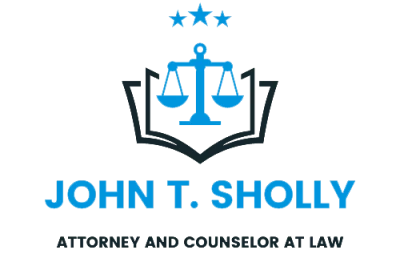Concord Divorce Lawyers
Facing a divorce involves navigating numerous legal complexities due to the changing dynamics within the family. Regardless of whether the separation with your soon-to-be ex-spouse is amicable, seeking the guidance of an experienced Concord divorce lawyer is crucial to ensure a fair and equitable resolution in the final divorce agreement.
John T. Sholly, Attorney and Counselor at Law is deeply committed to client satisfaction and is happy to hold meetings at your home or any place that fits your schedule and comfort.

Our Divorce attorney is committed to helping people in Concord navigate the divorce process. We have an in-depth knowledge of Tennessee family law and can efficiently lead you in dealing with divorce-related issues, such as shared parental responsibilities and asset division. We understand the value of your time, and to better serve you, our lawyer is available for consultations at your home or a location that is most suitable for you, providing you with a personalized and efficient experience.
Our passionate divorce lawyer will help organize all the legal documents you need for the proceedings. We’ll represent you and proactively advocate for your rights and interests during negotiations and court hearings. More importantly, we’ll aim for divorce terms that work best for any children involved.
Whether your divorce is particularly contentious or there are high-value assets in question, trust that John Sholly can handle your case efficiently. So talk to our divorce lawyers as soon as you plan to get a divorce or get served with a notice.
Call John T. Sholly, Attorney and Counselor at Law today at (865) 276-7228 for your consultation with a Concord Divorce Lawyer. Busy? We will come to you!
Dedicated Divorce Support
Our Concord divorce attorney is committed to helping our clients get through their divorce in the least stressful way possible. We aim to provide comprehensive legal assistance from the beginning until the end of your case.
Regardless if you’re the one filing or the party receiving the Complaint for Divorce (also called a Petition for Divorce), John T. Sholly, Attorney and Counselor at Law is the best Concord legal team you can have. Our knowledge of Tennessee family law and attention to detail will help ensure we can legally address your children’s needs.
It will be our job to make sure that you have all the required documents to support your case, including paperwork that shows the following:
- Income
- Assets
- Debts
- Tax returns
- Bank statements
- Credit card statements
- Personal financial statements
Even after the divorce agreement is finalized, we can still help you file for modifications in the settlement terms for various issues. For instance, if circumstances have changed in ways that warrant a shift in your and your ex-spouse’s responsibility regarding alimony, child support, and child custody, we can initiate the modification process and see it through with you.
How Does Divorce Work in Tennessee
There are two ways through which a divorce can end in Tennessee: divorce trial and settlement.
In a divorce trial, you and your ex-spouse are bound to follow the court’s ruling. The terms have little flexibility since the judge will have the final decision after hearing both sides.
But while a trial can effectively address all issues related to the divorce, trials can also be expensive and messier than a settlement. Family, friends, and even children can be called to give statements. The process can also take longer, so you’ll have to pay more for legal fees.
In a divorce settlement, you and your ex-spouse can have better control over the final terms of the agreement. You can even agree on things the court can’t otherwise decide, like mandating the non-custodial parent to pay for the child’s college expenses. Courts cannot impose parental obligations on either party for adult children.
Additionally, the settlement process can offer more privacy. Unlike in a trial, the discussions won’t be a matter of public record, so your problems and possibly negative emotions won’t be displayed to your friends and family.
More importantly, you and your ex-spouse will find it easier to abide by the settlement terms you agree to. Instead of being forced by the court to do something, you worked towards a compromise with equitable benefits for each party.
Deciding Between a Divorce Trial or Divorce Settlement
Both processes can address all the aspects that must be resolved following a divorce. However, every case involves distinct circumstances that may make a trial or settlement more favorable than the other. In the end, the choice will be up to you.
We will, of course, suggest after we’ve assessed your case. But the decision will depend on how much time and money you can spend and your readiness to go through a lengthy, emotional court battle. Because as much as settlement is the easier option, not every couple can make that work.
If you and your soon-to-be ex-spouse can’t reach a compromise through settlement, the best action is to prepare for trial thoroughly. Our divorce lawyers can help you with this, ensuring that your proposed terms for specific issues (e.g., alimony, child support, child custody) are well-suited to your needs and backed up by documents and witness testimonies.
Child Custody & Child Support
Divorce cases can take a more complicated turn if children are involved. Agreements should not only depend on the couple’s preferences but also the children’s welfare. And at John T. Sholly, Attorney and Counselor at Law, our Concord divorce lawyer can help you ensure that child custody and child support terms will be in your child’s best interests.
Tennessee family law requires divorcing couples to have a permanent parenting plan to outline the responsibilities of each parent. It will also dictate the parents’ decision-making authority (legal custody), as well as the day-to-day living arrangements of the children (physical custody).
Our lawyers can help you draft a proposed parenting plan that is best for your child’s well-being. If you and the other can’t agree on the parenting plan, the court will assist in the finalization of the parenting plan, taking your child’s welfare as the primary deciding factor.
For child support, several factors must be considered to determine its amount. These include the income of both parents, the parenting time of each parent, and the number of children to be supported. After the child support order is finalized, an automatic charge for the assignment of wages will take effect. This will automatically deduct the required amount from the paying parent’s paycheck.
There are also statutory maximums for Child Support in Tennessee:
- $2,100 per month for one child
- $3,200 per month for two children
- $4,100 per month for three children
- $4,600 per month for four children
- $5,000 per month for five or more children
Alimony or Spousal Support
Under Tennessee law, the court can order one spouse to pay alimony to the other spouse during a divorce or for a certain period after. Alimony (spousal support) can be paid via lump sum or periodic payments. Or depending on the specific circumstances in each case, the alimony payment can be extracted from either spouse’s property.
There are many factors that the court will consider when deciding on the alimony’s amount and duration. These factors generally include the length of the marriage and the standard of living of the couple during their marriage.
However, our Concord divorce lawyers can help ensure a fair alimony agreement regardless of your circumstances. Whether you are the paying spouse or the one requesting support, it’s our goal to make the final arrangements feasible for you.
Types of Alimony in Tennessee
Four types of alimony in Tennessee can be awarded in your case. Our lawyers can explain more comprehensively how each differs and which is best suited for your situation.
Rehabilitative alimony
This alimony is awarded to help the supported spouse become financially independent by increasing their earning capacity. This can be done by returning to school, training in, and acquiring more skills to help them get employed. The goal is to help the supported spouse earn a living that allows for a standard of living close to their previous marital lifestyle.
The duration of rehabilitative alimony will depend on how long the court deems necessary for the supported spouse to find employment finally. If you request maintenance and need support beyond the original term the court ordered, you can request a review to extend your alimony. If either of the spouses dies, the rehabilitative alimony will be terminated.
Alimony in futuro (periodic alimony)
If the supported spouse cannot earn enough and become financially independent, alimony in futuro can be awarded. This type of alimony can be a long-term or short-term support order that can sometimes be permanent.
The duration of alimony in the future will depend on the needs of the supported spouse and the ability of the paying spouse to continue paying. The alimony will continue to be paid until the date ordered by the court or when the supported spouse remarries or the paying spouse dies.
Transitional alimony
This alimony is awarded when the supported spouse does not need rehabilitation but still needs financial assistance before fully adjusting to their post-divorce standard of living.
The duration of transitional alimony depends on the date set by the court. It will also stop once the spouse dies, or the supported spouse remarries. Due to its temporary nature, the court may also establish other conditions for this type of support.
Alimony in Solido or lump-sum alimony
This type of alimony is a form of long-term support. After the court determines the amount of alimony, the paying spouse will pay this through installments over a specific period. One reason for the court to award alimony in solido is to help the supported spouse cover the legal expenses of the divorce process and meet their post-divorce needs.
Alimony in Solido will only end once the paying spouse successfully pays the total amount set by the court. The alimony won’t be terminated even if either spouse dies, remarries, or lives with another party.
Asset & Property Division
Even an amicable breakup and marriages without children can still undergo a messy divorce process. This is mainly because dividing properties and debts often inspire disagreements between the parties.
But the good news is that our Concord divorce lawyers are experts in handling asset, property, and debt divisions. We’ll ensure that all necessary documents are organized to support your rightful claim over the assets and properties.
However, you need to remember that Tennessee is an equitable distribution state. Suppose you and your soon-to-be ex-spouse cannot agree on dividing your marital properties through a divorce settlement or mediation. In that case, the court will see that the properties are divided fairly and reasonably.
This doesn’t necessarily mean that all marital properties will be divided 50/50. Instead, the court will consider the following factors to ensure that each spouse receives a fair portion:
- The earning capacity of each spouse
- The age, physical health, and mental well-being of each spouse
- The financial needs and liabilities of each spouse
- The contributions to the acquisition of properties and assets by each spouse, as well as contributions as a homemaker
- The duration of the marriage
- Existing alimony and child support agreements
- Existing pre-nuptial and post-nuptial agreements
Under Tennessee law, only marital properties will be divided equitably during divorce. These properties include everything that you and your spouse acquired during the marriage.
Business Owner, High-Value, or High-Profile Divorce
Mr. Sholly understands that divorce can become more complicated if it involves a high-profile couple or high-value assets and businesses. That is why we guarantee that if you work with our divorce lawyers, we will handle your case with the utmost confidentiality, attention to detail, and proactiveness.
Our Concord, Tennessee law firm will carefully evaluate all assets involved in your marriage. Our lawyers work alongside relevant experts who can efficiently locate and value your marital assets, even if they include complicated and foreign ones, such as the following:
- Domestic and foreign real estate
- Trusts
- Life insurance policies, proceeds, and annuities
- Money market and other financial accounts
- Patents and other intellectual property
- Privately and publicly held companies
- Stock options and employee benefit plans
- Foreign employee benefit plans
- Pensions, retirement accounts, and severance packages
- Professional practices and partnerships
- Oil and mineral rights and royalties
Rest assured that our divorce lawyers will look after your interests and exercise your rights in the best way manageable. We will ensure you’ll receive your fair share of marital assets and help you transition to a post-divorce life as smoothly as possible.
Talk To Our Legal Professional Today

If you want to file for divorce or just received a petition for divorce from your spouse, talk to our Concord divorce lawyers immediately. We are committed to making the divorce process as smooth as possible and even provide in-home consultations.
We’ll guide you while ensuring you’re on top of your legal rights and responsibilities.
Call John T. Sholly, Attorney and Counselor at Law today at (865) 276-7228 for your consultation with a Concord Divorce Lawyer!





